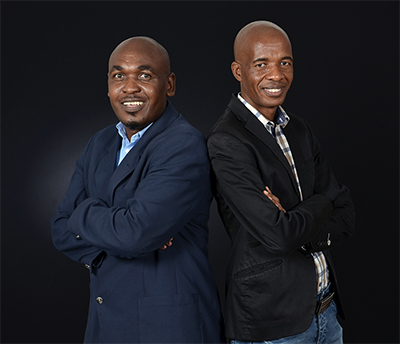Leading change
From security guard to archives supervisor

Jonathan Mukwevho (Master's student, Unisa) and Prof Mpho Ngoepe (Department of Information Science, Unisa)
Unisa is not only an African university shaping futures in the service of humanity, but it is an academic home that nurtures and inspires the leaders of tomorrow. Previously employed as a security guard and now a supervisor in archives and records management at the Auditor General of South Africa (AGSA), Jonathan Mukwevho (43) attests to the caring open distance learning at the institution that helped him to advance in his academic and professional career life.
Mukwevho, who is currently studying a Master’s of Information Science at Unisa, says being the firstborn in a family of six children was tremendously influential in getting him to matriculate with exemption in 1993 and enrol for social work in the University of Venda. He would later drop out and took a decision to stay with his father in Mamelodi, east of Pretoria, for better career prospects.
How he became a security guard
Growing up in Gumela rural village, in Limpopo, Mukwevho says financial strains in his academic journey propelled him to look for any job opportunity to help him finance and complete his studies.
There was no stopping for this dynamic character from moving stones, as he eventually joined Unisa to further his studies part-time.
How he became interested in archives and why he chose Unisa
“I chose Unisa because of its global stature and appeal, as well as its ability to cater for people with full-time jobs,” he says.
Mukwevho also speaks highly of Prof Mpho Ngoepe, who encouraged him to work hard and never lose hope. “Professor Ngoepe persuaded me to make good career choices,” he said, explaining how he became interested in archives.
“After completing my honours degree, Prof Ngoepe persuaded me to do my postgraduate studies in the field of archives and records management, as well as to register for a master’s degree in the same field, as there was little research done in South Africa in that focus area; his mentoring efforts are greatly appreciated because it created a long-term relationship that helps me succeed in pursuance of my academic career with ease. May the Almighty God bless him and his family for many more years to come” he added.
How he managed to balance his studies with working full time
On balancing full-time-employment and studying-part-time, Mukwevho says he normally registers his studies early around December before the initial academic calendar starts. “This gives me an opportunity to plan properly and integrate my studies with my work programme,” he says.
He adds that the adoption of new technologies by Unisa made the university a perfect choice for him. He is one of the students who relies heavily on the use of technologies such as myUnisa to communicate with the university, including submission of assignments.
“I also ensure that my family and friends know beforehand what I want to do and achieve so that they understand when I am not available at some point for them, at the same time without alienating them,” he says.
About the role Ngoepe has played in Mukwevho’s academic career
Mukwevho refused to let the heavy rotational shifts of his job be a stumbling block in his career plans; he showed up at all the workshops the university provided. “While I was presenting at one of the symposiums organised by Unisa’s Information Science Department, I noticed signs of fatigue from Mukwevho, and approached him after the symposium to check why he looked so sleepy during the session,” Ngoepe says. “I realised he was just coming from a night shift duty and he was a first year-student then. Thereafter, his enthusiasm and commitment delighted me, hence we exchanged contacts and forged a mentor and mentee relationship,” Ngoepe added.
Speaking on Jonathan’s academic journey, Ngoepe said: “I am glad that he was involved in an international project called InterPARES, coordinated by the University of British Columbia (globally) and on the African continent by the Department of Information Science at Unisa.
“I hope he will register for a doctoral degree, even if not with Unisa or me to avoid inbreeding. Mukwevho is living proof that it doesn’t matter where you are coming from but it matters where you are going. As well, he has shown that the sky is not the limit but the limit is in oneself.”
*Interview by Lesego Ravhudzulo
Publish date: 2018/03/12